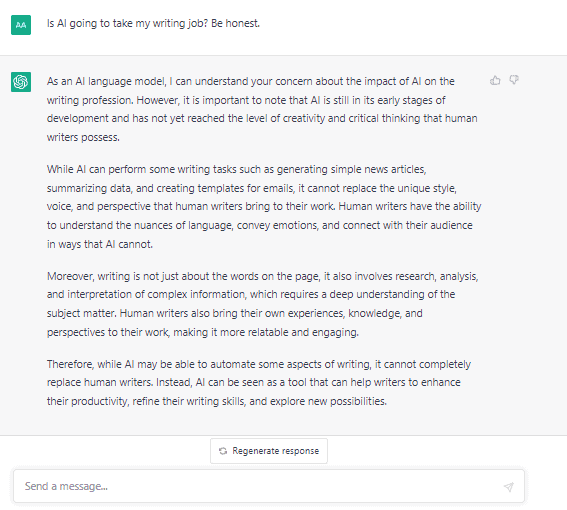Artificial Intelligence (AI) is transforming B2B healthcare marketing and marketing at large in countless ways. AI is a boon for marketers, from automating mundane tasks to providing valuable insights and personalization. You can stop running in fear now. Really.
That said, AI’s shortcomings remain and are well documented.
Here are four key areas where adding AI to your toolkit can help you achieve your goals
1. Data Analysis and Insights: One of AI’s core strengths is its ability to analyze large amounts of data quickly and accurately. With AI-powered analytics, B2B healthcare marketers can gather insights into customer behavior, preferences, and needs. These insights can then be used to inform marketing campaigns and strategies, and to personalize content for individual customers.
For example, AI can analyze customer data from multiple sources, such as social media, website traffic, and purchase history, to create detailed customer profiles. Marketers can then use these profiles to create personalized marketing messages tailored to each customer’s needs and interests.
2. Content Creation: This is the part where writers typically cringe or weep. To those reevaluating their career paths, I offer these non-AI-generated words of solace: AI cannot replace you, but it certainly can help you. It is increasingly used to automate content creation – from social media posts to product descriptions and video content. By using AI-powered content creation tools, marketers can save time and resources while creating high-quality pieces that engage their audience.
AI can generate blog post ideas based on popular search queries and trending topics. It can also help with copywriting by analyzing data on the most effective keywords and phrases for marketing messages. It can help you through writer’s block, for sure. More often than not, however, I’ve found its prose still benefits from a wordsmith’s touch.
AI-powered video creation tools are also becoming more popular, allowing marketers to create engaging video content quickly and easily. These tools can analyze data on audience preferences and create videos tailored to their interests.
3. Personalization: Personalization is what it’s all about, even in B2B healthcare marketing, as clients expect content and messages tailored to their specific needs and interests. AI is a powerful tool for personalization, allowing marketers to create highly targeted marketing messages based on customer data and behavior.
For example, AI can personalize email marketing campaigns by analyzing your target audience’s behavior and preferences and tailoring messages accordingly. It can also personalize website content by creating dynamic content that changes based on the user’s behavior and preferences.
4. Ad targeting and optimization: AI-powered ad targeting and optimization tools are becoming increasingly sophisticated, allowing marketers to create highly targeted and effective ad campaigns. These tools can analyze customer behavior and preferences data to create highly targeted ads and optimize ad campaigns in real-time for maximum impact.
5. Chatbots as marketing informants: Chatbots are an increasingly popular way for businesses to provide customer service and support. By using AI-powered chatbots, businesses can provide 24/7 support to clients without the need for human intervention.
Chatbots can answer common client queries, provide product recommendations, and even process orders. They can also be used to gather data on client preferences and behavior, which can be used to inform marketing strategies.
AI’s shortcomings
AI is powerful, but not a perfect content creation solution. For one, AI-generated content can lack the human touch that makes content genuinely engaging and memorable. While it may be informative and well-written, it may also lack the creativity and emotion of a human writer. How do I know? I asked ChatGPT.
Additionally, AI-generated content can sometimes be repetitive or formulaic, making it less enjoyable to read. This is why using AI as a tool rather than a replacement for human ingenuity is essential.
While AI may be useful for generating content, such as product descriptions or social media posts, it may be less effective for more complex pieces, such as thought leadership articles or case studies.
Brace for change
AI is a powerful tool for marketers, with countless applications across the B2B healthcare marketing landscape. From data analysis and insights to content creation and personalization, AI can help marketers to save time and resources while still creating high-quality marketing messages that engage their audience. By leveraging the power of AI, marketers can stay ahead of the competition and develop more effective marketing campaigns and strategies.
Marketers should prepare to adapt and learn as AI technology evolves. As AI becomes more sophisticated and integrated into marketing workflows, marketers must stay up-to-date on the latest developments and best practices.
If you want to know more about how AI should fit into your marketing strategy, our health IT marketing agency can help.
Contact one of the top 200 B2B demand generation agencies today!



